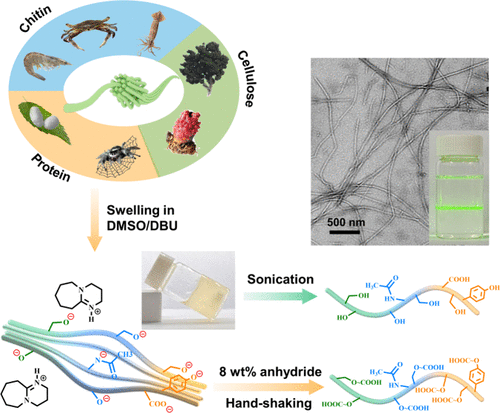发新帖
作者最近主题:
- Coaxially spinning stretchable zin-ion battery fiber with waterproof and scissorability.Nano Energy. 2024. Ling Li , Yijun Chen , Suxu Wang , Danfeng Pei , Mingjie Li , Tingxi Li , Chaoxu Li DOI:10.1016/j.nanoen.2024.109662
- Versatile Deprotonation-Induced Exfoliation and Functionalization of Biological Nanofibrils for Actuation and Fluorescence.ACS Appl. Mater. Interfaces 2024. Bailang Zhang , Ting Wang, Mingjie Li, Minghao Mu, Zheng Wang, Yuwei Chen, and Chaoxu Li.
- Zwitterionic liquid crystal elastomer with unusual dependence of ionic conductivity on strain and temperature for smart wearable fabric.Chemical Engineering Journal.2024.Yongpeng Wu , Fang Wei , Tingxi Li , Mingjie Li , Danfeng Pei , Chaoxu Li.
- Capturing aqueous uranyl ions into catalytic nanometric shells of liquid metal droplets for electrochemical reduction,Chemical Engineering Journal,2024,Zhuanzhuan Zhai, Lifen Long , Xinpeng Che , Bailang Zhang , Ting Wang , Mingjie Li , Chaoxu Li
- Electrochemically exfoliated covalent organic frameworks for improved photocatalytic hydrogen evolution,Journal of Materials Chemistry A,2023,Ting Wang, Ruijuan Zhang, Pengda Zhai, Mingjie Li, Xinying Liu, Chaoxu Li, DOI: 10.1039/d3ta06312g
- Regioisomeric Benzotriazole-Based Covalent Organic Frameworks for High Photocatalytic Activity,ACS Catalysis ,2023,Ting Wang , Mingjie Li*, Yijun Chen, Xinpeng Che, Fuzhen Bi, Ying Yang, Renqiang Yang*, and Chaoxu Li*,DOI:10.1021/acscatal.3c04145
- Two-Dimensionally Nano-Capsulating Liquid Metal for Self-Sintering and Self-Oscillating Bimorph Composites with Persistent Energy-Harvest Property, Advanced Functional Materials ,2023
- Tough and Photo-Plastic Liquid Crystal Elastomer with a 2-Fold Dynamic Linker for Artificial Muscles. ACS applied materials interfaces. 2023. Yongpeng Wu , Danfeng Pei*, Fang Wei, Ping Liu, Mingjie Li, Tingxi Li*, and Chaoxu Li*.DOI:10.1021/acsami.3c08390
- 李超 2022级联合培养研究生
- 黄新宇 项目聘用

